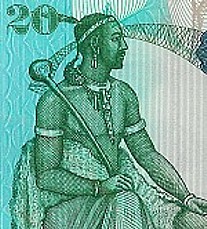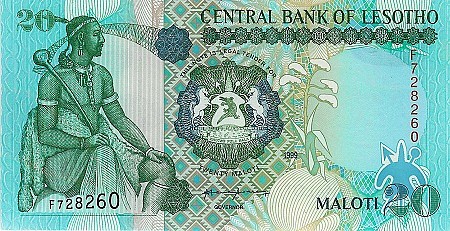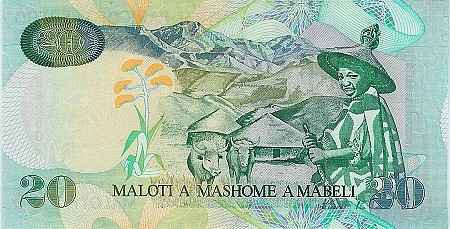LESOTHO
King Moshoeshoe I

Considered the founding father of Lesotho, King Moshoeshoe I was born during a famine in Menkhoaneng in the northern part of Basutoland (what is now the northern part of Lesotho) to a minor chieftain of the Crocodile (Kuena) Clan. Because of the famine, he was given the name Lepogo, meaning disaster. His parents raised him to hold the higher virtues of a leader, which he was destined to become. As a young man, Lepogo (Moshoeshoe I) assisted his father in gaining power over other clans.
By the age of 34 he led a party to pursue a cattle thief. During the raid, Lepogo, as he was then known, shaved off the beard of the thief to disgrace him. This act earned him the name Moshoeshoe, meaning ‘The Shaver’. He returned with many hundreds of cattle, a new name, and a new role as a leader. Soon after, Moshoeshoe I had started his own clan and settled with them at Butha-Buthe Mountain.
During the same time the Zulu tribe, led by Shaka, had been increasing their territory in south east Africa. Those who would not submit to the Zulu king had to flee. The Butha-Buthe Mountain was defensible but it had its limits, so in 1824 Moshoeshoe relocated his clan to the Qiloane plateau, later known as Thaba Bosiu , or Mountain of the Night. Located near the modern town Maseru in the Northwest part of what is now Lesotho, Thaba Bosiu would be almost impossible to capture as the summit is surrounded by vertical cliffs, has good grazing grounds for cattle and there are springs that bring fresh water to the top. The name Mountain of the Night was adopted because of the legend that it would grow tall through the night, and become smaller during the day. Thaba Bosiu was attacked several times through the reign of Moshoeshoe, but was never conquered. Moshoeshoe founded the Bosotho Nation within Basutoland and was known as ‘The Great Chief of Basotho’. He created a nation-state with a single language, a unified army for all the people under his authority, and a central government. Moshoeshoe treated his defeated enemies with friendship, providing land and protection to the people. This fostered the strength of his nation as he gained influence and won followers. Many of the refugees of the Zulu Wars were integrated into Moshoeshoe’s emerging nation.
The European colonists began a migration north from southern Africa during this same period. Moshoeshoe decided that he would be able to benefit from a European advisor in dealing with them. Missionaries were said to bring with them special privileges, including political and military benefits. Sending cattle to induce missionaries to come, three of them showed up. They were Eugene Casalis, Constant Gosselin, and Thomas Arbousset from the Paris Evangelical Missionary Society. They stayed with Moshoeshoe’s two eldest sons at Makhoarane where present day Morija is. Moshoeshoe’s belief in the missionaries paid off. They introduced potatoes, wheat, fruit, pigs, opened schools and printed Sotho Language books. Because the French Missionaries were not part of the colonizing forces, they were accepted as citizens in Moshoeshoe’s kingdom. Eugene Casalis served as Moshoeshoe’s foreign minister from 1837-1855. Casalis was invaluable to Moshoeshoe in his dealings with the colonizing Europeans.
During the 1830’s the Boer Trekkers in Southern Africa were approaching the borders of Basutoland, and eventually crossed into Moshoeshoe’s territory. Moshoeshoe remarked that they were welcome to graze their animals there as long as they recognized his authority and did not venture further into his kingdom. These Trekkers were complacent at first, but as their numbers grew, they began to show their real intentions. Military conflicts ensued. Moshoeshoe realized that he had to sign a treaty with the British in order to fend off the increasing numbers and demands of the Boers. The treaty annexed land to the British that the Boers had settled. This understandably focused the Boer’s ire against Moshoeshoe and the British. In 1848 the Boers started a skirmish, but were quickly put down. In 1851 the British who were in Basutoland as part of the treaty were worried that Moshoeshoe had become too powerful and led an unsuccessful attack against him. A second attack by the British was repelled in 1852, which was a huge embarrassment to the mighty British army.
In 1854 the British pulled out of Southern Africa leaving two rival nations: The Boer’s Free Orange State and Basutoland. Territorial wars between Moshoeshoe and the Boers followed. In 1858 Moshoeshoe defeated the Boers in what was known as the Free State- Basotho War. In 1865 Moshoeshoe lost a war which cost him most of his western lowlands. Another war in 1867 was not going well for Moshoeshoe and he appealed to the British. The British were eager to regain a presence in the area and by 1868 Basutoland became a British Protectorate, which ended the war with the Boers. A treaty between the British and the Boers in 1869 defined the boundary of Basutoland and is today’s boundary for Lesotho. Moshoeshoe had lost one half of his land through the war and treaties.
Though land was lost, Moshoeshoe was able to keep his people and his culture together by preventing their annihilation during the Zulu and Boer wars. Basutoland remained a British Protectorate until it gained independence in October 1966.

